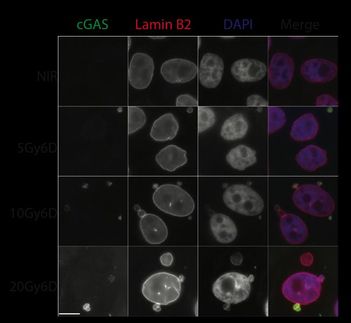Extreme competive sports: A fitness test for DNA
Unusually high levels of physical exertion do cause oxidative stress, but this does not result in any long-term damage to DNA. This is just one of the many outcomes revealed by an extraordinary research project funded by the Austrian Science Fund FWF that are now published. As part of this project, 42 male athletes took part both in a triathlon and an extensive biomedical study, which examined numerous physiological values parameters during the period from two days before to 19 days after the triathlon.
The range of personal views on the benefits - or otherwise - of physical activity covers everything from "sport is good for you" to "sport is a killer". From a scientific perspective, there is no doubt that regular sporting activity has physiological benefits, however, there is no such clear evidence of the benefits of extreme endurance sports. Indeed, there are indications that ultra distance runners, for example, may suffer increased health risks due to high oxidative stress. This generates aggressive oxygen radicals and metabolites which can damage cells and cell components. The question of whether this exercise induced stress also causes the DNA damage often observed as a consequence is now set to be answered by the Austrian Science Fund FWF project.
The project comprised 42 male participants in the Ironman Austria competition. Of these, 24 participants were then used to investigate possible DNA damage. Head of the study, Prof. Karl-Heinz Wagner of the Department of Nutritional Sciences at the University of Vienna, comments on the results: "Reactive oxygen species lead to oxidative stress in the body which can also cause DNA damage. We were able to gather clear evidence of a short-term increase in certain indicators for oxidative stress during the competition and have already published these results. However, now we were also able to demonstrate that, despite this increase, no notable and persistent damage was caused to the athletes' DNA. This is a surprising result which initially appears to contradict the data gathered in similar studies."
Recently, other studies showed that runners in an ultra marathon experienced increased DNA damage during the race. This was also true of marathon runners immediately after the race. However, these studies did not consider competitions which required a period of physical exertion lasting longer than 8 hours, nor was data collected over such an extended timeframe as in Prof. Wagner's project. In total, the Austrian research team took blood samples from the triathletes at five different time points - 2 days prior to the race, then 20 minutes and 1, 5 and 19 days after the race.
In response to the apparent contradictions, Stefanie Reichhold, who supervised the operational side of the project alongside Oliver Neubauer, explains: "The comparable studies analysed different biomarkers for predominantly short-lived DNA damage. Our study focused primarily on damage to DNA that was subsequently evident in daughter cells following cell division and could therefore be of long-term detriment to the body. However, we can sound the all-clear in this respect - our study clearly shows that, in this case, extreme competitive sport did not result in any increase in DNA damage."
For Prof. Wagner's team, this result shows that a well-trained body responds to increased oxidative stress - and the associated risk of DNA damage - by intensifying the activation of counter mechanisms. These could be mechanisms for repairing DNA, but they could also be means of combating the causal reactive oxygen species. This interpretation is consistent with other recently published results of this study which show that the body experiences a very rapid and extremely inflammatory reaction during the period of exertion - and that these physiological processes subside equally rapidly. Overall, the results of the FWF project indicate that the effects of extreme sport are very much dependent on the fitness of the individual up to the molecular level.
Original publication: Triathlon. S. Reichhold, O. Neubauer, V. Ehrlich, S. Knasmüller & K.-H. Wagner; "No acute and persistent DNA Damage after an Ironman"; Cancer Epidemiol Biomarkers Prev 2008, 17(8), 1913-1919.






















































